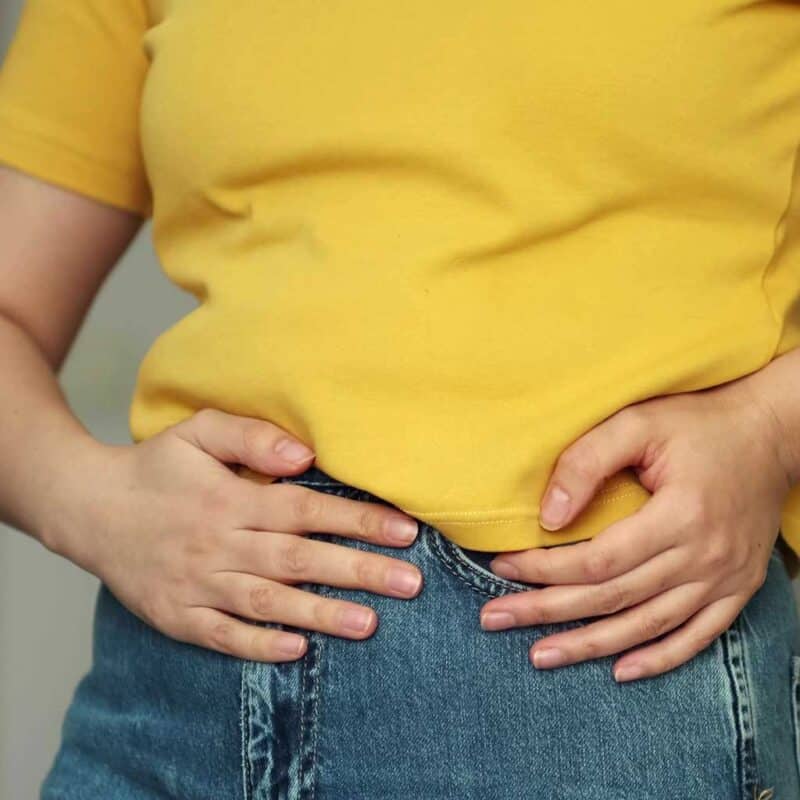Natural treatment for small intestinal bacterial overgrowth (SIBO) is in the top ten of searches related to SIBO This condition is no longer a rare occurrence but unfortunately affects a significant number of people. It is estimated that 20% of people suffer from intestinal discomfort with no apparent cause. Increasingly, these intestinal disorders have one thing in common: an abnormal overgrowth of bacteria in the small intestine.
While these symptoms are often linked to SIBO, they are not exclusive to the condition, posing challenges in diagnosis and treatment delays. Identifying potential risk factors, utilizing accessible screening techniques, and being aware of existing solutions are essential steps to promptly managing SIBO.
To learn more about the symptoms of SIBO, we invite you to read our article on the subject >>.
Table of Contents

Bacterial overgrowth: Why is it so difficult to identify?
Bacterial overgrowth is characterised by a wide range of intestinal symptoms, such as bloating, gas, abdominal pain, diarrhoea, malabsorption of nutrients, fatigue and weight loss.
All of these symptoms can be attributed in isolation to other bowel conditions such as irritable bowel syndrome (IBS), constipation or functional diarrhoea. In these cases, it is difficult to determine the exact underlying cause: is it the IBS that manifests itself through IBS and other functional bowel diseases, or is it the other way around?
…and the starting point for other diseases
Upon investigation, researchers observed that SIBO is also associated with diseases unrelated to the gut. It may be linked to neurological or rheumatic disorders, suggesting that the byproducts of gut microbiota metabolism may have a direct or indirect impact on emotional, cognitive and immune functions, thus increasing the likelihood of developing such diseases.
Conversely, underlying diseases unrelated to SIBO may contribute to its onset and worsen its symptoms.
Ultimately, no matter how you look at it, untreated SIBO can lead to the development of very debilitating diseases in the host, adding to an already extensive list of symptoms.

How do you know if you have SIBO?
Bacterial growth in the small intestine does not go unnoticed. Biologists have several methods at their disposal to detect and recognise the signature of this abnormal growth, which is a matter of debate in the scientific community. There are two main types of methods: invasive and non-invasive.
SIBO screening tests
The presence of proliferating bacteria leaves an easily identifiable trail. When bacteria metabolise dietary carbohydrates in the small intestine, they produce by-products such as gas, hydrogen and methane. These gases are absorbed into the bloodstream and transported to the lungs, where they can be expelled when exhaled.
This is where hydrogen and methane breath tests come into play. By measuring the concentration of these gases in exhaled air, doctors can determine whether there is bacterial overgrowth in the small intestine.
Another method, less used due to its invasive nature, is the jejunal aspirate culture test. This technique involves taking a direct sample of fluid from the small intestine. Healthcare professionals often prefer respiratory tests, which are considered less restrictive for patients.
What are the risk factors?
The risk factors associated with the development of SIBO can be grouped into two main categories. The first category refers to our habits and characteristics, while the second category includes diseases that are likely to promote the development of SIBO.
Category 1: Habits and individual factors
- Age: The risk of developing SIBO increases with age, as intestinal motility tends to decrease over time, creating an environment conducive to bacterial growth.
- Alcohol and tobacco use: Studies have shown a significant correlation between smoking and the presence of SIBO. In addition, SIBO appears to be more prevalent in moderate alcohol consumers than in abstainers.
- Diet: Although dietary fibre is often beneficial to health, in the case of SIBO it can worsen symptoms by providing an additional substrate for bacterial growth in the small intestine. Practitioners recommend adopting a diet low in FODMAP (a subtype of dietary fibre that is difficult for bacteria to digest) to reduce symptoms.
- Use of medications, particularly proton pump inhibitors (PPIs): A meta-analysis of 19 studies found that long-term use of PPIs is a significant risk factor for SIBO. These drugs, prescribed to treat heartburn and gastro-oesophageal reflux disease, reduce the acidity of the stomach, creating a less hostile environment for bacteria and potentially favour their proliferation in the small intestine.
Category 2: SIBO-promoting diseases
- Intestinal motility problems: conditions that slow or alter intestinal motility (the motility of the food bolus), such as gastroparesis or coeliac disease, can cause food to stagnate in the small intestine, creating an environment conducive to bacterial growth.
- Dysfunction of digestive organs: diseases of the liver, pancreas or gall bladder can disrupt digestion and promote bacterial growth in the small intestine.
- Structural or anatomical abnormalities of the intestine: diseases such as diverticula, fistulas or intestinal strictures can cause stagnation of food and encourage bacterial growth.
- Metabolic disorders: by altering carbohydrate metabolism, metabolic disorders promote SIBO.
- Irritable bowel syndrome (IBS)…

Natural treatments for bacterial overgrowth and other strategies - can SIBO be cured?
You have just been diagnosed with SIBO and are probably wondering: can it be cured? Don’t worry, there are several solutions to effectively alleviate the symptoms, or even cure it completely. There are several options available to you. They are generally aimed at reducing bacterial growth in the small intestine, restoring the balance of the intestinal flora and correcting underlying digestive dysfunctions.
Approaches include:
- Antibiotics: Prescribed by your doctor, antibiotics are often used as a first-line treatment to kill excess bacteria in the small intestine.
- Probiotics: food supplements based on probiotic strains aim to restore the balance of intestinal flora after antibiotic treatment. They are also useful for maintaining digestive health.
- Prebiotics: Prebiotics found, for example, in mushrooms (in the form of (beta-glucans) can modulate the gut microbiota by promoting the growth of good bacteria in the gut, thus restoring intestinal homeostasis.
- Diet: your SIBO may be subject to “dietary rebalancing” to reduce symptoms and prevent relapse. This includes the Fodmap diet, but other solutions may also be proposed.
NATURAL TREATMENTS FOR BACTERIAL OVERGROWTH - SIBO HIFAS STUDY
Recently, Hifas Da Terra has conducted a prospective, randomised, single-centre study in patients with positive irritable bowel syndrome (IBS) at the Functional Digestive Disorders Unit (FFD) in Andalusia, to improve the quality of life of patients.
The control group followed a low FODMAP diet.
The intervention group combined the use of supplements containing specific strains of Reishi and Lion’s Mane.
In this study, analytical data and a nutritional profile, a respiratory test and a complete biopsychosocial nutritional assessment were collected.
SUMMARY: LISTEN TO YOUR BODY
In summary, SIBO can cause a wide range of gastrointestinal symptoms. It is essential not to ignore these signs, even if they seem harmless, and to consult a healthcare professional to analyse them. If you act quickly, you can quickly get rid of these discomforts that can take over your life.
- https://www.univadis.fr/viewarticle/syndrome-de-l%25E2%2580%2599intestin-irritable-ou-sibo-small-2023a1000cc5
- Efremova I, Maslennikov R, Poluektova E, Vasilieva E, Zharikov Y, Suslov A, Letyagina Y, Kozlov E, Levshina A, Ivashkin V. Epidemiology of small intestinal bacterial overgrowth. World J Gastroenterol. 2023 Jun 14;29(22):3400-3421. doi: 10.3748/wjg.v29.i22.3400. PMID: 37389240; PMCID: PMC10303511.
- Efremova I, Maslennikov R, Poluektova E, Vasilieva E, Zharikov Y, Suslov A, Letyagina Y, Kozlov E, Levshina A, Ivashkin V. Epidemiology of small intestinal bacterial overgrowth. World J Gastroenterol. 2023 Jun 14;29(22):3400-3421. doi: 10.3748/wjg.v29.i22.3400. PMID: 37389240; PMCID: PMC10303511.
- Losurdo G, Leandro G, Ierardi E, Perri F, Barone M, Principi M, Leo AD. Breath Tests for the Non-invasive Diagnosis of Small Intestinal Bacterial Overgrowth: A Systematic Review With Meta-analysis. J Neurogastroenterol Motil. 2020 Jan 30;26(1):16-28. doi: 10.5056/jnm19113. PMID: 31743632; PMCID: PMC6955189.
- Onana Ndong, Philippe, et al. “Prevalence of small intestinal bacterial overgrowth in irritable bowel syndrome (IBS): Correlating H2 or CH4 production with severity of IBS.” JGH Open 7.4 (2023): 311-320.
